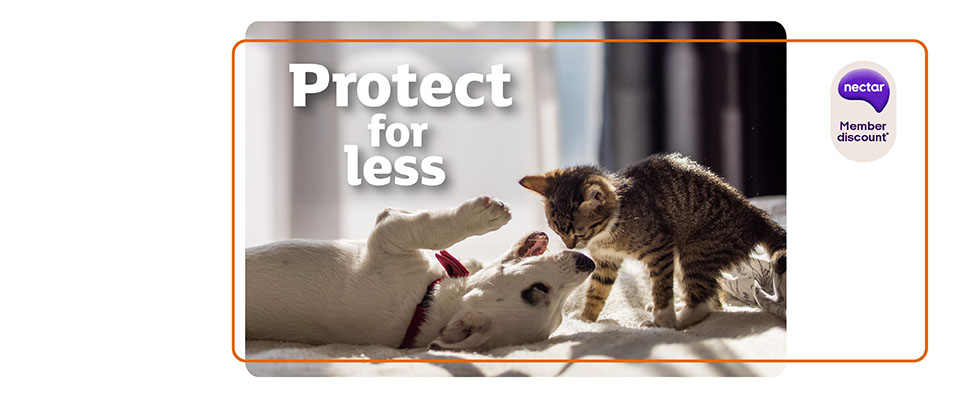Why should I vaccinate my cat?
Protecting your fearless feline is your main priority and luckily there are some cat injections that make it easier to do.
It’s important to vaccinate your cat to prevent them from picking up infectious illnesses or diseases when they’re out and about. In some cases, cat vaccinations can be the difference between life and death for your cat. It’s hard to imagine the worst happening, which is why it’s so important to be prepared and make sure that your cat is protected from common illnesses.
In fact, most cat insurance policies need your cat to be vaccinated for it to be fully covered. For example Sainsbury’s Bank Pet Insurance, provided by Pinnacle Insurance plc, cannot provide cover for treatments that could have been avoided if your cat was vaccinated (if recommended by your vet).
You may struggle to find a suitable place for your cat to stay if you go away. If you’re planning on taking your cat to a cattery at any point, bear in mind that they may require proof of cat vaccinations.
When should I get my cat or kittens vaccinated?
Your cute little kittens will need to have two sets of cat vaccinations before they can start exploring. The first of these is needed at nine weeks old and the second at three months. Then, they’ll need booster jabs every year.
If you adopt or rescue an older cat that is unvaccinated, speak to your vet about the best time to get them protected. But don’t worry, it’s never too late to start a cat vaccination programme. Your feline friend’s immune system will naturally weaken with age so it’s just as important that they’re covered too.
What happens at a vaccination appointment?
At the appointment your cat should have a full check up to assess their overall health and general fitness. They will check them from teeth to tail to make sure that everything is in working order. This is a good time to ask your vet any questions or raise any concerns you have.
The vaccination part of the appointment should be relatively quick and involves a small injection. It’s important to remember that it can take between three and four weeks for their immune system to build up and become fully protected.
How much are cat vaccinations?
The price of cat vaccinations varies depending on your cat’s needs. Indoor cats may need less than an outdoor cat that regularly roams in farmland or fields. The vet practice may also have an impact on the prices, so it’s best to call ahead to get an idea of the costs.
Once your kitten has had their full set of initial vaccinations your cat will need a yearly booster. You can expect this to be approximately £45 (correct as of June 2023).
How much are kitten vaccinations?
The average cost of kitten injections varies depending on their specific needs. Generally, you can expect the kitten vaccinations cost to be around £65 for their first two rounds (correct as of June 2023).
Do indoor cats need vaccinations?
While indoor cats are less likely to be exposed to certain diseases and ailments than outdoor cats, they should still be vaccinated. They can still pick up nasty viruses so it’s important that they are protected too.
What do cat vaccinations project against?
Cat flu
Cat flu can cause symptoms ranging from runny eyes and sneezing to mouth or eye ulcers. It can make vulnerable cats seriously ill and can be fatal to kittens or elderly cats if it’s not treated.
Feline leukaemia virus
Feline leukaemia virus commonly causes cancer of the blood cells and anaemia. But, it can also lead to cancer in the eyes, kidneys, liver, intestines and chest. It’s not airborne, but can be passed through direct contact, like licking or biting other felines.
It’s the most common infectious cause of death in cats under a year old. Sadly, it’s a very serious condition, and most cats will die within three years of diagnosis.
Feline chlamydophilosis
Feline chlamydophilosis is not part of the main vaccine protocol but may be offered by your vet for cats that may be more at risk. The bacteria causes conjunctivitis in cats. The virus is spread through direct contact with other cats, so is mainly seen in multi-cat households or litters of kittens.
Feline infectious enteritis
Feline enteritis is a serious or fatal gut infection that mainly affects kittens but adults can also catch it. It causes diarrhoea and severe vomiting and is most often fatal. As it spreads in the environment, unvaccinated cats are at high risk of contracting it.
Does pet insurance cover cat vaccinations?
Most cat insurance does not cover cat vaccinations. This is because they are seen as a routine procedure, whereas pet insurance is there to provide financial support in unexpected situations or emergencies.
Find out more about Sainsbury’s Bank Pet Insurance, provided by Pinnacle Insurance plc, and the protection it can provide.
Get a quote today.
Frequently asked questions
Is it illegal not to vaccinate your cat in the UK?
While it’s not a legal requirement, it’s strongly recommended to get cat vaccinations. They may protect your feline friend from catching a potentially life-threatening illness. It also helps to reduce the risk of them passing an infectious disease onto other cats that may live in your household or in your neighbourhood, that they may come into contact with.
Does my cat need annual vaccinations?
Yes, cats usually need annual boosters to make sure that they’re still protected from the infectious diseases. It’s especially important to remember that it’s not just kittens that need protecting, elderly cats are also vulnerable and it’s equally important that they have this care throughout their life.
Terms and conditions
* The discount is based on information related to you and the Sainsbury’s and Sainsbury’s Bank transactions linked to your Nectar account. For more information on how we use your data, go to sainsburys.co.uk/privacy
